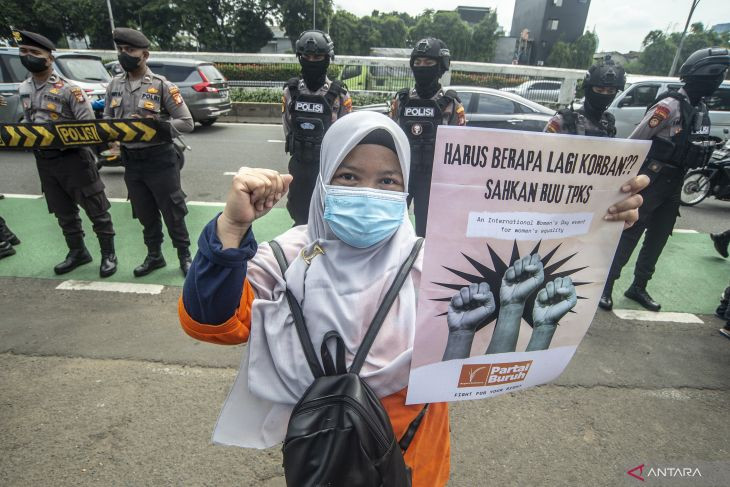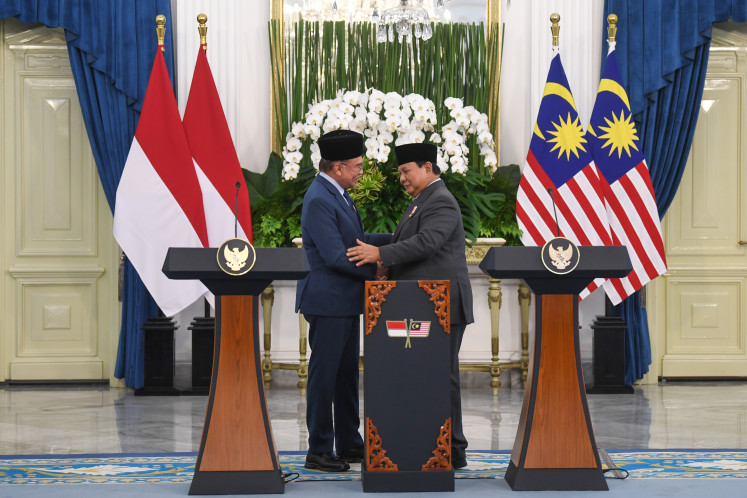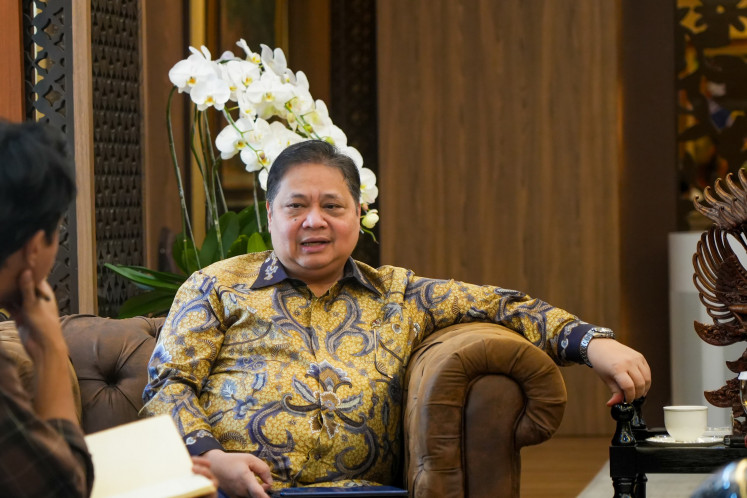Popular Reads
Top Results
Can't find what you're looking for?
View all search resultsPopular Reads
Top Results
Can't find what you're looking for?
View all search resultsInternational Women’s Day: Celebration or commiseration?
There is even the danger that feminism can be co-opted by the state and capitalism.
Change text size
Gift Premium Articles
to Anyone
Yesterday we celebrated International Women’s Day (IWD)! Yaaay!
A flurry of IWD greetings and slogans were exchanged, and a spate of webinars and even some offline events, leading up to March 8 and set to continue for up to two weeks after, as is usually the case every year.
Or is IWD this year more a time for commiseration than celebration? Certainly, deep reflection and drastic action, given the current state of the world. We are in the third year of the COVID-19 pandemic, and climate change is a real threat to humanity and our planetary existence.
Yet money is wasted on expensive conferences like the November 2021 United Nations Climate Change Conference (COP26) in Glasgow, which Greta Thunberg considered a colossal failure, calling it “a Global North greenwash festival.”
As Safina Maulida, a young ecofeminist wrote, “you destroy the environment, you destroy the basis of women’s livelihoods”. And guess what? Ecological crisis gives rise to an increase in violence against women.
So, it’s not for nothing that the theme for this year’s UN IWD is “Gender Equality for a Sustainable Tomorrow”. A tomorrow that is fraught with frightening uncertainty, I would add.
As if the COVID-19 pandemic and climate change were not enough, now there is the looming threat of a nuclear World War III, triggered by the Russian invasion of Ukraine, which is too scarifying even to contemplate. Kaboom! Bye-bye world!
Oh well, maybe it’s time to press the reset button anyway, given that our leaders constantly fail to address the real fundamental issues the world faces, and engage instead in window dressing events to perpetuate the status quo so they can sustain (sic!) their “business as usual” practices and their insatiable greed for profits.
The first Women’s Day observance was purportedly conducted on Feb. 28, 1909 in New York City, organized by the Socialist Party of America. But the March 8 date came from the former USSR, organized by women textile workers in Petrograd, demanding an end to World War I, food shortages and czarism. It eventually led to the Russian Revolution, and Leon Trotsky declared March 8 (Feb. 23 in the Julian calendar) as International Women’s Day. Well, I never!
Until 1967, IWD was predominantly a communist holiday. Then it was taken up by second wave feminists, which began in the 1960s and lasted for two decades. Just goes to show, if currently we look to Russia with fear, IWD, now celebrated worldwide, had its origins in Russia.
Looking back at the history of IWD, I wonder, should it now be called International Feminist Day? Feminism has a more contemporary, and purposefully activist ring to it after all. While feminism has its origins in the 19th century, it’s still controversial, misunderstood and even deliberately distorted, also in Indonesia.
For these reasons, the Gender and Democracy Center that I lead held a webinar on Feb. 24, “Feminism: does Indonesia need it?” due to the many opposing views about it.
In Indonesia there are movements #IndonesiaWithoutFeminist, #UninstallFeminism and "against feminism." These movements emerge from patriarchal Islamic groups, who consider feminism from the West, that feminism disrupts traditional family values and constructs, and is against Islamic principles.
However, in mid-January, the Nahdlatul Ulama (NU) included 11 women on its board of executives. Badriyah Fayumi and Alisa Wahid, two of the 11 women featured at the Rosi Talkshow "The New Face of Nahdlatul Ulama" openly claimed to be feminists.
Hello? So, who are the true Muslims? For me, obviously the latter!
To the Feb. 24 webinar, I invited two women and two men to speak: secular feminism represented by Atnike Nova Sigiro and Rocky Gerung, and Islamic feminism represented by Nina Nurmila and Marzuki Wahid – all unequivocally feminist. Yes, also the men!
The ensuring discussion, in talk show format led by the bubbly and vivacious young feminist Nadya Karima Melati, was extremely informative and stimulating. All the speakers argued their points on how both Indonesia and Islam benefited from feminism in all its forms and manifestations: Theory, philosophy, methodology, ethics and movement. Okay, I cheated, I didn’t invite anyone who was anti-feminist, but I thought, hey, why waste time?
If the GDC webinar was intended more to be a feminism 101, recently, on March 6, to celebrate IWD, LETTS Talk organized a four-hour roundtable which was a perfect follow-up to my center’s webinar. It was titled “Indonesian Feminism in the midst of Identity Politics and Social Anomalies”. LETSS Talk is a discussion forum created by Diah Irawaty and Farid Muttaqin, to discuss sex, sexuality and much, much more.
The nine speakers, ranging from university professors, writers, to activists in the field, provided a rich, informative discussion based on experience, research, very much grounded in contemporary realities. The speakers clearly demonstrated the complexity of the current situation in Indonesia and the arena within which feminism operates. At the grassroots level, the term feminism is not even used, not even understood perhaps. But the principles of gender equality and justice are being employed, nevertheless.
This year’s IWD slogan campaign is “Break the Bias”, with images of women crossing their arms in front of their chest. What does this mean? Well, we all have biases, whether conscious or unconscious, derived from one’s upbringing, class, race, ethnicity, gender, religion and obviously stereotypes. These biases are passed on, which is one of the bases for perpetuating patriarchy.
If we change “International Women’s Day” to “International Feminist Day” does that solve the problem? Not really. There are inherent contradictions – and biases – within the feminist movement as well. In the US it’s white feminism versus black feminist. Then there is First World Feminism and Third World Feminism.
First world feminists are often not aware of the colonial and imperialist biases they hold which I have personally and painfully experienced. There is even the danger than feminism can be co-opted by the state and by capitalism. What can one do? In the same way that Islam, Christianity, democracy can be interpreted, distorted and lived out in various ways, so can feminism.
The mainstreaming of feminism is one of its goals, but like the Reform Era which promised democracy but was co-opted by non-democratic forces, feminism can also be co-opted by patriarchal forces. How’s that for a contradiction?
In the end, feminism, whether theory or practice, is rooted in the history and specific sociopolitical context where it finds itself. No doubt there are still many things we need to resolve both within and among ourselves. But if the IWD movement of textile workers in Russia in 1917 inaugurated the Russian Revolution which overthrew the czar, we cannot discount the power of women. This was also the case in Indonesia, when a small group of women called the Voice of Concerned Mothers (SIP) inaugurated the Reform Era in which Gen. (ret.) Soeharto stepped down after 32 years of authoritarian rule.
The fact that patriarchal, capitalistic and oligarchic forces still dominate the world, constantly looking out to quash progressive social movements, including the feminist movement, is even more reason to make every day IWD, not just one day of the year.
***
The writer is the director of the Gender and Democracy Center, LP3ES.










